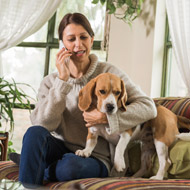Many pet owners unable to identify an emergency, study finds

The authors suggest that some pet owners may be using veterinary emergency services for convenience.
Almost two-thirds of small animal pet owners are not able to recognise when their animal needs out-of-hours care, according to a new study.
The authors say that, while the results only reflect behaviour for one out-of-hours service, they could be replicated across the small animal veterinary sector.
Veterinary practices in the UK must provide their clients with access to veterinary care outside of normal working hours. Like human emergency medicine, this system relies on members of the public knowing what an emergency is and understanding when to make contact.
Research in human medicine shows that some people use emergency services for the convenience of seeing medical staff when it suits them. However, no such research exists in veterinary medicine.
To see if a similar situation exists in the veterinary industry, a team from University Centre Hartpury, Gloucester, reviewed calls from one small animal out-of-hours service in the West Midlands.
Over three months, the service received 450 calls, of which 45 per cent were categorised as emergencies, while the remaining calls (55 per cent) were non-emergencies. Some of the most common reasons for calling included vomiting, breathing difficulties and lethargy.
The authors explain that the majority (up to 67 per cent) of small animal pet owners could not accurately identify veterinary emergencies within their animals.
They suggest that, like human emergency medicine, some pet owners may be using veterinary emergency services for convenience, ‘especially given the time demands associated with modern living and the emotional investment people have in their pets.’
Another possible explanation for the high number of non-emergency calls could be that pet owners are unsure whether their pet’s condition is an emergency or not.
The authors suggest veterinary practices could offer guidance on what conditions require emergency treatment. ‘Such investment would demonstrate the practices emotional investment in their clients and their pets, which should strengthen loyalty bonds,’ they write.
Published in Veterinary Record, the study is accompanied by an editorial written by Emily Thomas at the University of Edinburgh’s Royal (Dick) School of Veterinary Studies. In her article, Emily states that the study raises important questions about the most appropriate handling of non-emergency out-of-hours calls.
She discusses scope for an NHS 11 style telephone service, saying “it is likely that the patient will receive more cost effective and possibly better care if treatment is delayed until normal working hours.” However, “there may be pressure from the client to provide immediate care. The vet may also be constrained by practice treatment policies dictated by commercial pressures.”
Instead, she suggests all members of the out-of-hours team, including receptionists, “should be trained in telephone triage and should be aware of common clinical signs constituting an immediate emergency.”



 The RCVS has announced a new version of its 1CPD mobile app, with enhanced features for veterinary surgeons and veterinary nurses to record their continuing professional development.
The RCVS has announced a new version of its 1CPD mobile app, with enhanced features for veterinary surgeons and veterinary nurses to record their continuing professional development.